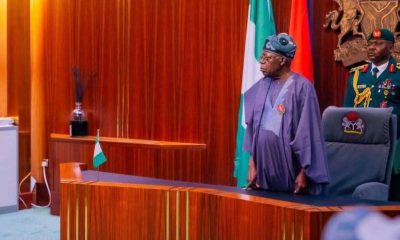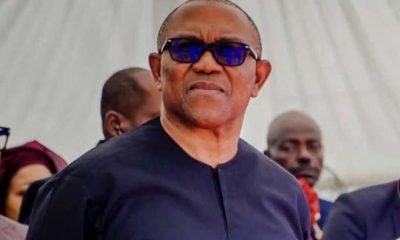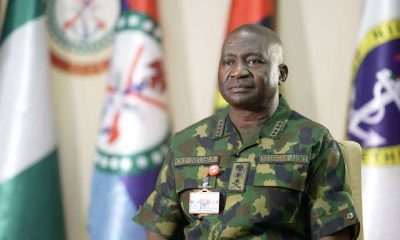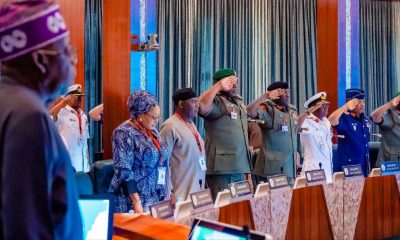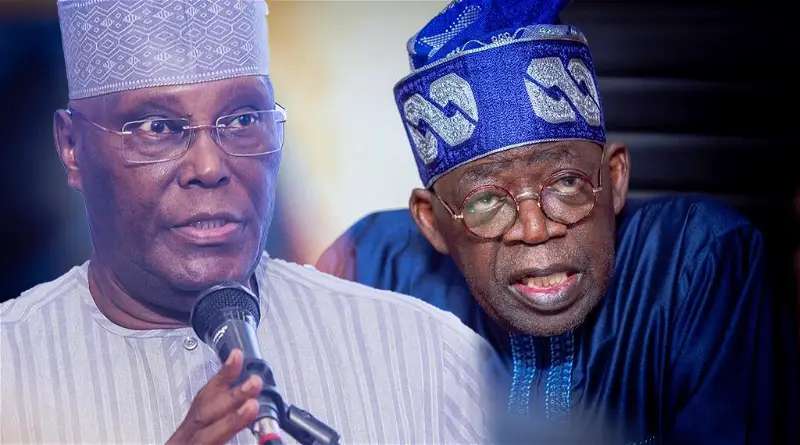Nation
Insecurity: Nigeria’s N3bn ‘ransom economy’ troubles retired generals, FG

As Nigeria inches closer towards near anarchy over the frightening atmosphere of insecurity, the report that bandits and kidnappers generated about N2.56 billions in ransom payments in one year has ricocheted up calls for any measures to stem the tide of insecurity.
This has forced the President Tinubu administration to come up with a revised national counter-terrorism strategy; as Nigerians condemn the growing rate of kidnappings, killings, and insecurity, which are now fueled by essentially economic factors.
The report of payments by Nigerians of N2.56b as ransom to kidnappers in one year shocked the nation.
Concerned about the restive–ness and anxiety of the people, National Coordinator, National Counter- Terrorism Centre (NCTC), Office of the National Security Adviser, Maj.-Gen. Adamu Laka, two weeks ago said that President Bola Tinubu would officially unveil the revised national counter-terrorism strategy in October this year.
Laka, who disclosed this in Abuja while speaking at the third quarter stakeholders’ meeting of NACTEST, noted that this followed an extensive review process tailor- made to align the nation’s security framework with emerging threats.
The NCTC boss also stated that the document had been worked on to a final stage and forwarded to the National Security Adviser (NSA), Nuhu Ribadu, for approval.
A Huge Financial Enterprise
Meanwhile Nigerians have been reacting to a new report by SBM Intelligence which states that Nigeria’s kidnap-for-ransom economy has hit record levels, with citizens paying at least N2.56 billion between July 2024 and June 2025 to secure the release of abducted relatives and community members, with, at least, 4,722 people abducted.
These figures represent a critical 144 per cent year-on-year increase compared to N1.05 billion paid in the same period of the previous year.
The study themed: Locust Business: The Economics of Nigeria’s Kidnap Industry – A 2025 Update, cautions that kidnapping has become a a big and thriving highly organised and pervasive criminal enterprise, rather than an isolated security challenge.
In the period under review, according to SBM Intelligence, it recorded 997 incidents across the country, in which 762 people were killed, including 563 civilians.
The North-West, as far as the report goes, remains the epicentre, representing about 62.2 per cent of victims. Zamfara alone accounted for 1,203 abductions, while Katsina recorded the highest number of incidents of 131.
It stated that abductors demanded N48 billion in ransom during the period, but only 5.35 per cent was actually paid, stating that in total, 4,722 Nigerians were kidnapped in 997 incidents, while 762 people lost their lives in abduction-related violence.
“In 2024, families paid N1.05 billion, but currency depreciation meant this was valued at only about $655,000. By 2025, ransom payments climbed to N2.56 billion, yet the dollar equivalent rose only slightly to $1.66 million.
This mismatch between naira and dollar values highlights the impact of inflation and exchange rate pressures.
The report also notes that Kidnappers now demand higher sums in local currency to protect their earnings from the naira’s weakening value. Families, in turn, are forced to part with larger amounts of money, even as household purchasing power collapsed under double-digit inflation.
“This convergence of crime and ideology has made kidnapping not just a security problem but also a financing model for insurgency,” the report further state.
As Nigerians continue to live in atmosphere of insecurity and uncertainty over what tomorrow portends, some retired generals have weighed in, giving their opinions on the way forward.
They have again called on the Federal Government to urgently equip the Armed Forces, amid growing concerns over the resurgence of terrorists’ attacks and killings in different parts of the country, especially North Central, North East and North West.
Though budgetary allocations to the defence and security sectors have steadily increased, there have been complaints and anxiety about the quality and volume of arms available to the troops, raising questions about opaqueness in defence spending.
According to BH’s findings, in 2023, the Federal Government earmarked N2.98 trillion for defence and security. This rose to N3.25 trillion in the 2024 budget, and for 2025, President Bola Tinubu proposed a record N4.91tn out of the N49.7tn national budget, aimed at enhancing the operational effectiveness of security agencies.
In spite of these substantial investments, Nigeria continues to face serious security challenges, including insurgency and banditry.
There have been concerns and criticisms of whether the current approach in figuring insurgencies is working.
Military Operational Gains
But in spite of the spike in terror attacks, the security operatives have made impressive gains in the past weeks. Only four weeks ago, the Nigerian Air Force (NAF) said it had unleashed an unyielding air onslaught against terrorist elements in the North-East, killing no fewer than 592 fighters and obliterating 372 enemy assets in eight months, a tempo of operations already outstripping the entirety of 2024 figure.
The Chief of the Air Staff (CAS), Air Marshal Hasan Bala Abubakar, revealed these figures in Maiduguri on Tuesday, August 12, 2025, during a courtesy visit to Borno State Governor, Prof. Babagana Umara Zulum.
However, retired senior military officers have enjoined the Federal Government to prioritize the procurement of modern combat equipment and improved intelligence support to the frontline troops.
They warned that without immediate intervention, the hard-won gains in the war against insurgency could be reversed.
Generals’ Take
Brigadier General Peter Aro (retd.) said the question of whether terrorists are better armed than the Nigerian military “is no longer rhetorical.”
Describing it as a red flag that demanded urgent intervention, Aro warned that the insurgent groups have evolved from ragtag militias to highly equipped forces with access to encrypted communications, drone surveillance, night-vision devices, GPS-guided explosives, and coordinated strike systems.
He stated, “While our troops remain committed and valiant, the battlefield has shifted from muscle to machine. Without matching this evolution, we risk sending brave soldiers into asymmetric warfare ill-equipped for modern threats. This isn’t about panic, it’s about parity.
“To stay ahead, Nigeria must make an urgent, strategic shift: fund intelligence, equip the army, and fast-track tech superiority. Gadgets that drive modern warfare, from satellite-linked sensors to AI-based surveillance tools, are prohibitively expensive, yet necessary.
Similarly, retired Brigadier General Bashir Adewinbi called for the military to be empowered with advanced intelligence-gathering tools, such as surveillance drones and surveillance technologies that could aid in planning and executing strategic counterterrorism operations.
“You see, what they (the terrorists) carry, it is above what our military is carrying,” Adewinbi affirmed. “We need equipment that can gather intelligence, monitor insurgents’ activities so the military knows what action to take,” he added.
Beyond a military solution, Adewinbi advocated for strong political will to address the root causes of insecurity, warning that some political actors may be exploiting the crisis for personal or partisan gain.
“They should be more stringent with whoever is involved in banditry or terrorist activities, regardless of who they are. Nigeria is our country, you don’t invite an enemy from outside just to discredit your political opponent, “ he said.
He also decried Nigeria’s porous borders, which he described as an open gateway for individuals with dangerous intentions. “Anybody can go and come, anyhow, anytime, without being monitored,” he noted.
A former spokesman for the Nigerian Air Force, Group Captain Sadique Shehu (retd.), demanded strict accountability, pointing out that without proper monitoring, funds allocated to the armed forces may be misused.
Speaking in a recent interview, Shehu noted that, “If you allow the military on their own to decide how to do their work and how to spend their money, the funds won’t get anywhere. In a democracy, either the executive branch, or the legislature, is supposed to be in a position to check these people. The system is awash with money, but there must be accountability.’’
He likened the situation to household spending, saying, “Even if you give your wife a million naira and you don’t check how the children are feeding, she might be the kind of woman that likes buying gold, or spending at ceremonies. Certainly, you gave her one million – there’s no doubt about that – but what is being done with that money? There is no oversight.
Former Chief of Army Staff, Lt. Gen. Tukur Buratai (retd.), has also weighed in, urging the Federal Government to consider a nationwide mobilization similar to the COVID-19 lockdown to defeat terrorism, banditry, and kidnapping.
Buratai, who spoke on Channels Television’s Sunrise Daily recently, said that allowing insurgency to continue to linger was dangerous for the country, hence the need to invest in tackling the problem.
“We can lock down this country to make sure everybody concentrates and deals with this cankerworm called terrorists, bandits, kidnappers, and so on,” he said.
Community resilience, involving collaboration among political, traditional, and religious leaders, was needed to find lasting solutions to address insecurity in Nigeria, the former army chief said.
“For example, I am not trying to give any excuse but the point is when there is a national crisis, we need to mobilise everybody, not just the military alone.”
Political Complicity
However, a former General Officer Commanding (GOC) of the 1 Mechanized Division, Nigerian Army, Kaduna, Major General Danjuma Ali-Keffi (rtd), has claimed that powerful individuals linked to terrorism financing and oil smuggling in Nigeria were exposed by security investigations, but later shielded from prosecution.
Speaking in an interview on Arise News Channel some weeks ago, General Ali-Keffi, who once headed the Operation Service Wing (OSW), tasked with dismantling terrorist financing networks, said painstaking investigations revealed financiers, facilitators, and sponsors of Boko Haram terrorists, including some with political connections.
According to him, the coordinated arrests of Boko Haram leaders and financiers around 2017–2018 significantly weakened the insurgents, leading to mass surrenders and eventually the death of their leader, Abubakar Shekau.
Ali-Keffi disclosed that Nigeria’s efforts enjoyed intelligence support from foreign allies, including the United Arab Emirates, the United Kingdom, and the United States.
The retired Army General revealed that investigations unearthed shocking connections, but were not acted upon thereafter. “We stumbled upon an airline owner, who was allegedly moving weapons for Boko Haram. Some of those arrested were linked to cabinet ministers, and even retired senior military officers,” he recalled.
He lamented that despite the presence of representatives from the Department of State Services (DSS), Defence Intelligence Agency (DIA), Nigeria Financial Intelligence Unit (NFIU), and the Office of the Attorney-General of the Federation during the probe, high-profile suspects were quietly released.
“As the commander, I made my concerns known to the President at the time. He assured me I should report to him and him alone. But as the investigations progressed, I began to see hesitation and resistance. Eventually, some of these people were released and never prosecuted,” General Ali-Keffi stated.


